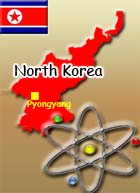West pessimistic about North Korea bending during nuclear talks
 Beijing, Dec. 8 : Western representatives who will attend negotiations starting today on North Korea''s nuclear programme, are reportedly pessimistic about any progress being made.
Beijing, Dec. 8 : Western representatives who will attend negotiations starting today on North Korea''s nuclear programme, are reportedly pessimistic about any progress being made.
According to The Telegraph, the six nations involved in the talks – North Korea, South Korea, China, Japan, the United States and Russia -- have battled on and off for more than five years to implement a lasting plan to end Pyongyang’s nuclear programme.
The current crisis, one of many to afflict the process, concerns North Korea''s refusal to allow nuclear samples from its programme to be taken abroad for sampling.
This is threatening the provision of the energy supplies with which the reclusive regime of Kim Jong-il is being rewarded for agreeing to decommission its nuclear reactors.
About a half of the million tonnes of fuel oil promised in February 2007 have so far been delivered, and the plutonium-based plant at Yongbyon, north-east of the capital Pyongyang, which provided the material for the country''s first nuclear test in 2006 has been put out of service.
The Telegraph, however, says key challenges remain - such as what to do with the nuclear weapons and weapons-ready material so far constructed, and crucially whether North Korea will admit to a separate uranium enrichment program, whose existence has long been alleged by the United States.
But even verification of steps taken so far remains at issue.
A number of group meetings took place this morning before the afternoon start of the full conference, which also includes Russia, China and North Korea itself.
Another obstacle is that North Korea says it will not recognise Japan at the talks. Japan and North Korea have a separate argument over the fate of Japanese citizens kidnapped and taken to North Korea in the 1970s, and Tokyo has currently suspended its provision of fuel supplies.
The North Korean regime has a track record of putting a hold on co-operation in light of international politics, apparently hoping to put additional pressure for compromise on new leaders, such as Mr Obama. (ANI)